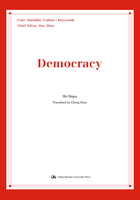
3. “Demos” and “-cracy”: unity of content and form
The scope and quantity of “demos” in democracy, to a large extent, have effects on the form and process of “-cracy” in democracy. It is thought that direct democracy is more suitable for small countries while indirect democracy seems to be a better choice for modern countries whose territory and population go far beyond the homogeneous state that the citizens can reach. Nonetheless, we must notice that both direct democracy and indirect democracy are tools and ways for citizens becoming masters rather than democracy itself. Based on this, the question “what is democracy” must be considered by combination of content, form and target, means.
On the one hand, the purpose and goal of democracy, from the aspect of content, is to achieve “people as masters”. Basic differences between democracy and oligarchy, monarchy, aristocracy lie in whether the people are foundation of the country and effectively exercise powers as masters. Real democracy should make the public aware of their “original powers”, that is to say, the public should be sovereign of their own and every citizen should be able to manage social public affairs, equally, freely and independently. In this sense, the real democracy is based on “people” as a whole to make the entire state system “special content of the people and the special existence form of the people” . Just as Karl Marx said, democracy is “selfgovernance of people” achieved via the whole country.“Within democracy, state system itself is just a kind of regulations for people to perform self-governance... state system shows up its true face, that is, product of freedom.”
. Just as Karl Marx said, democracy is “selfgovernance of people” achieved via the whole country.“Within democracy, state system itself is just a kind of regulations for people to perform self-governance... state system shows up its true face, that is, product of freedom.”
On the other hand, the democracy, from the aspect of form, is a kind of state systems.“Democracy is a kind of state systems that are similar to concepts.” Both direct democracy in Athens and representative democracy upheld by most western countries run in a way where realization of democracy in governance cannot be completely guaranteed. Without effective constraints, both direct democracy and indirect democracy will deviate from their original courses, giving rise to non-democracy. As a result, if we want to truly achieve “rule of people” instead of standing still in thinking, we must set up a truly democratic system. With this democratic system, the whole country will become “a kind of union where everyone's free development functions as basis for free development of all”
Both direct democracy in Athens and representative democracy upheld by most western countries run in a way where realization of democracy in governance cannot be completely guaranteed. Without effective constraints, both direct democracy and indirect democracy will deviate from their original courses, giving rise to non-democracy. As a result, if we want to truly achieve “rule of people” instead of standing still in thinking, we must set up a truly democratic system. With this democratic system, the whole country will become “a kind of union where everyone's free development functions as basis for free development of all” . Under such system, everyone, as a member of a free union, can have its powers and structure of democracy unified and, through programmed systems, “Make sure that all the people are entitled to manage the country, especially local authorities and various enterprises in multiple forms, and also entitled to civil rights”
. Under such system, everyone, as a member of a free union, can have its powers and structure of democracy unified and, through programmed systems, “Make sure that all the people are entitled to manage the country, especially local authorities and various enterprises in multiple forms, and also entitled to civil rights” , so that democracy as an ideological form can be externalized to actual political form.
, so that democracy as an ideological form can be externalized to actual political form.